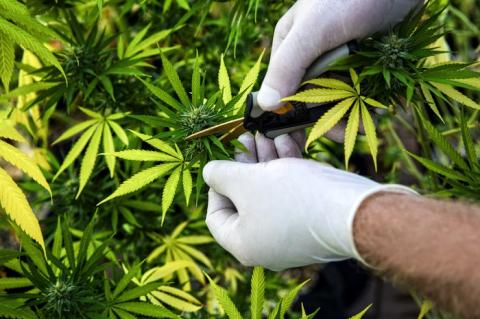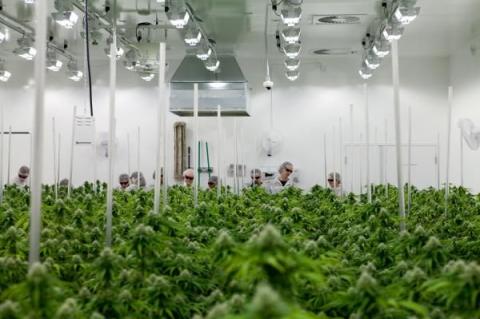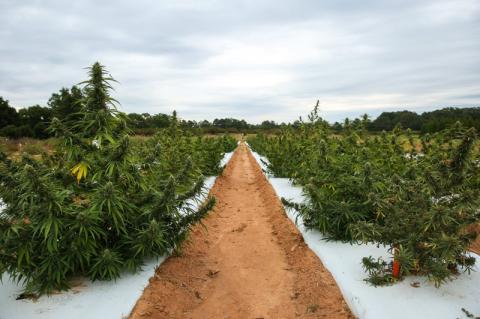With legalization hitting more states by the month, and with support for marijuana legalization in the United States at an all-time high at 65 percent, the need for political action on behalf of the cannabis industry -- the world’s fastest-growing market -- has never been greater.
Despite the cannabis industry’s meteoric rise, we are bumping up against a ceiling. Cannabis remains a federally-illegal, all-cash-based industry. It depends on outdated and unpredictable financial practices and systems. As a result, cannabis infrastructure fails to keep up with demand, and the illicit market continues to thrive (a recent audit found there are three times the illicit dispensaries than legal ones in California), which further fragments the market and caps growth.
Unlike other developed industries, cannabis lacks access to the lifeblood that allowed those businesses to even get started: modern banking and financing. Without access to formal financial services and capital, entrepreneurs in the legal cannabis market lack flexibility to reinvest and grow. Without traditional financing, ventures are blocked from accessing lines of credit to hire more talent, take calculated risks like other legal businesses, and are more likely to be delinquent on payments. A lack of access to banking also leaves thousands of workers in the financial shadows -- impeding employees from improving their own credit, preventing them from using common mechanisms like direct deposit, and forcing them to risk their safety by carrying too much cash with nowhere to put it.
While people and businesses in the cannabis industry suffer from the lack of access, so, too, do local and state tax coffers. Cannabis businesses are barred from paying taxes via check so that states and public institutions are missing out on hundreds of millions in public dollars. Take California, for instance, where marijuana tax collections fell $100 million short of expectations, and marijuana revenue projections by the state through June 2020 were cut by $223 million.
For the cannabis industry to realize its full potential, federal and state authorities need to treat it like any other American industry. That starts with legalizing the cannabis industry’s access to modern banking and financing.
We can start in Washington.
The U.S. House of Representatives recently made history by voting 321-103 to pass the SAFE Banking Act (H.R. 1595) -- a bill that would enable financial institutions to serve state-authorized cannabis businesses without fear of federal punishment. 91 Republicans voted for the measure in one of the few examples of bipartisan Congressional action this year. The bill’s next hurdle is the U.S. Senate.
The SAFE Banking Act would enable financial institutions to serve state-authorized marijuana businesses without fear of federal punishment. Passage of the SAFE Banking Act would be one of the most important actions Congress could take to support the cannabis industry, acting as the first major step in funding the rising marijuana economy.
Early in the summer, the California Senate passed SB 51, allowing cannabis businesses to create accounts with certain chartered banks and credit unions for specific cannabis business-related purposes. Unfortunately, the bill stalled, but it’s sponsor, Senate Majority Leader Bob Hertzberg, is planning to resurface it next year. Nevada is drawing from the gambling industry to pilot a three-year program, which would allow the state’s cannabis industry to deal in tokens for a more secure financial medium. Earlier this month, in Illinois, Gov. J.B. Pritzker signed a bill prohibiting state financial regulators from penalizing or discouraging banks and credit unions from serving cannabis businesses.
Not only are these federal and state initiatives the right thing to do, they’re also popular. According to polling from the Third Way, 67 percent of Americans across the political spectrum want Congress to enact legislation allowing financial institutions to support legal cannabis operators.
Access to modern banking and financing will transform the industry. It will incentivize businesses to join the legal market, as the illicit market won’t have access to banking. It will allow entrepreneurs to write checks to pay their taxes, take out a loan to invest in their business, or go paperless to pay their expenses. Financing for cannabis will improve public safety by reducing the literal bags of cash in dispensaries, warehouses and homes. And, with banking, there's a serious opportunity to legitimize the industry to skeptics who still view cannabis as they did in 1995. Stable jobs will be created, and it will allow cannabis to be part of the mainstream economy.
The cannabis industry will continue to push for federal legalization, but the first step toward empowering the cannabis businesses is pushing state representatives in the Senate to pass the SAFE Banking Act. The cannabis industry, like any industry, deserves access to modern banking and financing solutions. At the same time, the industry can only follow the lead of states developing and passing creative solutions.
This is the fastest growing industry on the planet. It’s high time for state legislators to treat it that way.









